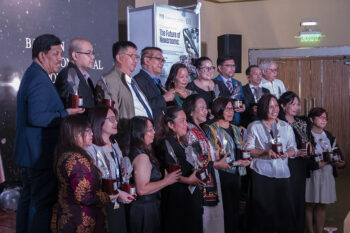DAVAO CITY (MindaNews / 12 Nov) – Mindanao stakeholders are encouraged to come up with a better “plan, priority, and practice” in terms of disaster-proofing the communities to improve their adaptability to climate change and ensure food security.
At the second day of the two-day 1st Mindanao River Basin Organization Conference held at the Grand Regal Hotel on November 11 to 12, Jose Maria Lorenzo Tan, vice chairman and chief-executive-officer of the World Wide Fund for Nature (WWF) in the Philippines, told reporters that there will be more typhoons with the same or stronger intensity as Yolanda that ripped through the Central Visayas in 2013.
“Change in heat will have the change in extreme weather. Storms become stronger and stronger every year. We have seen typhoons over short period, over three typhoons every year,” he said before over 240 river basin stakeholders coming from all over Mindanao.
For the last three months, he said a shift of direction of weather patterns has been observed going towards Mindanao, an island region that used to be free from typhoons for several years.
“Mindanao has seen Pablo and it won’t be the first one,” he said.
Tan, however, added that the sea level must also be considered when bracing for disasters because the sea level for every area would vary depending on the area.
“The sea levels are not the same, sea level changes in every part of Mindanao,” he said.
In Davao City, where a jump in population is expected over the years brought about by migration from Luzon, Tan said it is important that the people should understand the concept of “biocapacity,” defined by the WWF as “the capacity of ecosystems to produce useful biological materials and to absorb waste materials generated by humans, using current management schemes and extraction technologies.”
With the rise in population, Tan also said that the food, energy, and water are interrelated and crucial in Mindanao.
“If you look at food, look at how much of this are agriculture. It is very clear that Mindanao should learn how to integrate water and energy planning,” he said.
He also pointed out that it is necessary not to push the sustainable limit of the natural resources.
For instance, he explained that local governments must look at other sources of potable water other than what is existing to possibly lessen the risks of overusing the ground surface water.
“We have to learn multi-sourced water supply option for Mindanao. We cannot do what it was, in the future,” he said.
“If we talk about planning, practice, priority, the importance is how do you encourage the private (sector) to think about careful what they wanna do,” he said.
